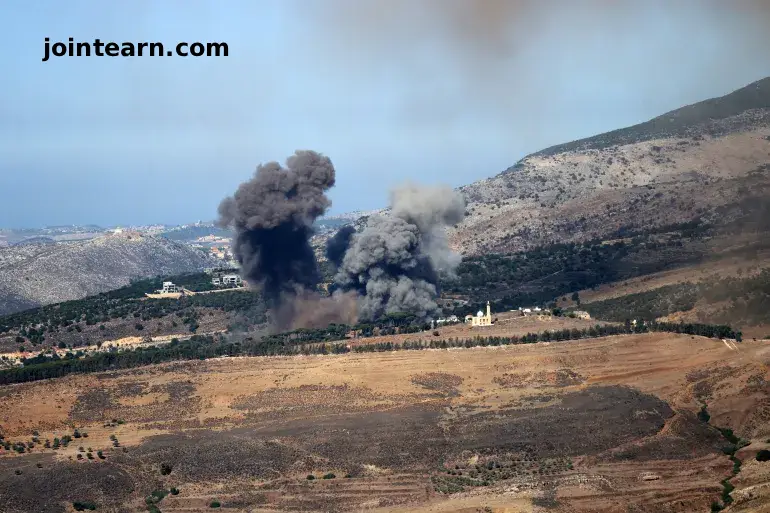
Hezbollah welcomes Joseph Aoun’s decisive move as Israeli forces kill a Lebanese municipal worker in a cross-border operation.
Rising Tensions Along the Lebanon-Israel Border
Lebanon’s President Joseph Aoun has directed the Lebanese Armed Forces (LAF) to confront any future Israeli incursions following a deadly cross-border raid in the southern town of Blida. The overnight Israeli operation, which killed a Lebanese municipal worker, has sparked widespread outrage and heightened fears of renewed conflict between Lebanon and Israel.
The announcement, made Thursday, comes amid escalating Israeli air raids and ground violations that Lebanese officials say breach the November 2024 ceasefire agreement. According to Aoun, the repeated Israeli attacks constitute “clear acts of aggression” and demand an immediate, firm response from the Lebanese state.
Presidential Order to Defend Lebanese Sovereignty
In a meeting with Brigadier General Rodolphe Haykal, President Aoun instructed the army to “defend Lebanese territory and ensure the safety of citizens.” His statement, released by the presidential office, marks one of the strongest government stances against Israeli military operations in years.
The decision follows a violent raid in Blida, where Israeli forces stormed the town hall and killed municipal worker Ibrahim Salameh. Lebanon’s state-run National News Agency (NNA) reported that the Israeli troops infiltrated more than one kilometer into Lebanese territory, firing multiple rounds that damaged the building before withdrawing at dawn.
The Israeli military later confirmed the operation, claiming its troops encountered “an immediate threat” while targeting alleged Hezbollah infrastructure. However, no evidence was provided to substantiate those claims.
Government and International Reactions
Prime Minister Nawaf Salam condemned the incursion, calling it “a blatant attack on the sovereignty and institutions of the Lebanese state.” President Aoun urged the United Nations ceasefire monitoring committee to take stronger measures and pressure Israel to respect the ceasefire terms.
The United Nations Interim Force in Lebanon (UNIFIL) confirmed it is investigating the incident. Lebanese army units have since deployed to the affected area, though details of their operations remain undisclosed.
Hezbollah Expresses Support for Lebanese Army
Lebanon’s most powerful non-state actor, Hezbollah, welcomed President Aoun’s order, stating that the Lebanese army “has the full backing of the resistance.” The group, formed in response to Israel’s 1982 invasion, remains a central player in Lebanon’s defense and regional politics.
Hezbollah has fought multiple wars with Israel, notably in 2006, and more recently during the 2023 conflict, which devastated southern Lebanon and cost the group several of its top commanders. The current escalation threatens to undermine the fragile truce that followed the November 2024 ceasefire.
Ongoing Israeli Strikes in Southern Lebanon
Shortly after the Blida raid, Israeli aircraft conducted air strikes on Mahmoudiyeh and Jarmak, two southern Lebanese towns. The Lebanese NNA reported extensive material damage but no confirmed casualties. The Israeli Defense Forces (IDF) claimed the strikes targeted Hezbollah facilities but provided no independent verification.
In Beirut, residents reported hearing the buzz of an Israeli Hermes 450 drone, a surveillance aircraft capable of carrying missiles. Overflights of Lebanese airspace by Israeli drones and warplanes have become near-daily occurrences, further inflaming tensions.
Ceasefire in Jeopardy
The November ceasefire agreement required Israel to withdraw from southern Lebanon, while Hezbollah was to pull back north of the Litani River and dismantle its military positions. Under the terms, only Lebanese army units and UN peacekeepers were to operate in the border region.
However, Israel still occupies five positions inside Lebanese territory, and analysts say its ongoing raids are part of a strategy to prevent reconstruction and weaken Hezbollah’s influence in the south.
Over the past month, more than 20 Lebanese civilians have been killed in Israeli air raids, according to the Ministry of Public Health. The government accuses Israel of exploiting the fragile ceasefire to pursue regional military objectives.
Broader Regional Impact
The renewed Israeli attacks extend beyond Lebanon. Over the past week, Israeli strikes have also targeted Syria and the occupied West Bank, even as Gaza remains under intermittent bombardment. Regional analysts argue that these actions reflect a broader Israeli strategy to keep neighboring states unstable and divided.
Lebanese officials, meanwhile, are under pressure from the United States and Western allies to rein in Hezbollah’s arsenal to avoid a full-scale confrontation. Yet Hezbollah insists it will not disarm under foreign pressure, vowing to defend Lebanon against “continued Israeli aggression.”
A Nation on Edge
As smoke still rises from the bombed-out villages of southern Lebanon, residents brace for the possibility of another war. President Aoun’s directive to the army signals a turning point in Lebanon’s stance toward Israel, potentially reshaping the dynamics of the border conflict and the future of peace in the region.
For now, Lebanon remains a nation on edge — balancing diplomacy, resistance, and the ever-present threat of another Lebanon-Israel war.


Leave a Reply